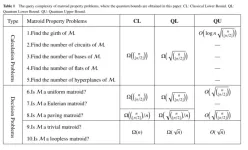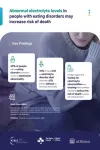(Press-News.org) Quantum computers show advantages over classical computers in some problems, such as unordered data base searching and prime factorization. Finding more problems that can take quantum speedup has become one of the focus problems in quantum computing. Before this, there is no research work on the quantum query complexity and quantum algorithm for matroid problems. It is interesting and meaningful to search for structures that can take quantum advantage in matroid problems.
In order to study the possibility and limitation of acceleration of quantum computing in matroid problems, a research team led by Lvzhou LI published their new research on 15 August 2024 in Frontiers of Computer Science co-published by Higher Education Press and Springer Nature.
The team investigates the quantum query complexity of some basic matroid problems and presents asymptotically optimal quantum algorithms for some of them.
In the research, they apply a technique called the quantum adversary method to prove the lower bound of the quantum query complexity of these matroid problems. The quantum adversary method is a versatile method for proving lower bounds on quantum algorithms. For some of these problems, they give asymptotically optimal quantum algorithms based on the quantum search algorithm (Grover’s algorithm). These results show that for these fundamental matroid problems quantum speedup is possible.
Future work can focus on finding the structure of matroid problems with more quantum speedup and matroid problems for the Noisy intermediate scale quantum (NISQ) era to demonstrate quantum dominance.
DOI: 10.1007/s11704-023-3130-9
END
Quantum speedup and limitations on matroid property problems
2024-09-18
ELSE PRESS RELEASES FROM THIS DATE:
Unravelling an ancient European extinction mystery: Disappearance of dwarf megafauna on palaeolithic Cyprus
2024-09-18
Scientists have unravelled a mystery about the disappearance of dwarf hippos and elephants that once roamed the picturesque landscape on the Mediterranean island of Cyprus before palaeolithic humans arrived.
Cyprus only had two species of megafauna present during the Late Pleistocene — the 500-kg dwarf elephant (Palaeoloxodon cypriotes), and the 130-kg dwarf hippo (Phanourios minor), but both species disappeared soon after humans arrived around 14,000 years ago.
In examining the reasons behind the extinction of these prehistoric animals, research funded by the European Regional Development Fund and the Republic of Cyprus through the Research and Innovation Foundation ...
Highly-sensitive beaks could help albatrosses and penguins find their food
2024-09-18
Researchers have discovered that seabirds, including penguins and albatrosses, have highly-sensitive regions in their beaks that could be used to help them find food. This is the first time this ability has been identified in seabirds.
An international team of researchers, led by the University of Cambridge, studied over 350 species of modern birds and found that seabirds have a high density of sensory receptors and nerves at the tip of their beaks, which has been previously identified in specialised tactile foragers such as ducks.
The researchers say this touch-sensitive region could have come from a common ancestor, and further work is needed to determine ...
Self-reporting of health may lead to underestimation of health inequalities in England
2024-09-17
UNDER STRICT EMBARGO UNTIL TUESDAY 17 SEPTEMBER 23:15 UK TIME (BST).
Self-reporting of health may lead to underestimation of health inequalities in England
Peer reviewed | Observational study | People
A first-of-its kind analysis of data collected from England’s annual health survey found that of the people who reported their health as ‘poor’, those living in areas of high deprivation are likely to have worse health than those living in the least deprived areas.
This could mean that we are ...
New research shows how oral cancer cells avoid immune system
2024-09-17
Macquarie University researchers have discovered new information about how oral cancer cells may block the body's immune response. This could lead to better treatments for this aggressive disease.
Their research, published in the Journal of Oral Biosciences this month, looked at protein interactions in oral cancer cells that might stop our immune cells from attacking these tumours.
Oral cancer is the sixth most common cancer in Australia and the most common in India. Advanced forms of oral cancer are hard to treat, with patients typically surviving less than 12 months.
Lead author Dr Rajdeep Chakraborty from Applied Biosciences ...
Abnormal electrolyte levels in people with eating disorders may increase risk of death, poor health outcomes
2024-09-17
Ottawa, ON, September 17, 2024 – A new study published in The Lancet Psychiatry found that 32% of individuals with an eating disorder had abnormal electrolyte levels, which were associated with a higher risk of death from any cause.
The study, led by researchers at ICES and The Ottawa Hospital, found that electrolyte abnormalities were also linked to the development of other serious health conditions, including chronic kidney disease, bone fracture, bowel obstruction, and acute kidney injury.
This is one of the first large, population-based studies to identify an important risk factor for mortality and poor health outcomes in individuals ...
No major concerns about risks to offspring for would-be dads taking epilepsy meds
2024-09-17
Would-be dads taking drugs to stop their epilepsy seizures—and valproate in particular—should be largely reassured that the available evidence on the developmental risks to their offspring doesn’t justify any major concerns, concludes a systematic review of relevant studies published online in the Journal of Neurology Neurosurgery & Psychiatry.
The available evidence is scarce and inconsistent, but most studies indicate no heightened risk, the findings show, casting doubt on the stance taken by the UK drugs regulator, the MHRA, in particular, say ...
Fifth of GPs using AI despite lack of guidance or clear work policies, UK survey suggests
2024-09-17
A fifth of family doctors (GPs) seem to have readily incorporated AI into their clinical practice, despite a lack of any formal guidance or clear work policies on the use of these tools, suggest the findings of an online UK-wide snapshot survey, published in the open access journal BMJ Health & Care Informatics.
Doctors and medical trainees need to be fully informed about the pros and cons of AI, especially because of the inherent risks of inaccuracies (‘hallucinations’), algorithmic biases, and the potential to compromise patient privacy, ...
Novel triplet regimen yields promising response in advanced-phase chronic myeloid leukemia
2024-09-17
HOUSTON ― According to researchers at The University of Texas MD Anderson Cancer Center, 80% of patients with previously untreated or relapsed/refractory advanced-phase chronic myeloid leukemia (CML) – including both accelerated or myeloid blast phases of the disease – or Philadelphia chromosome-positive acute myeloid leukemia (AML) achieved a bone marrow remission when treated with a novel combination of decitabine, venetoclax and ponatinib.
Findings from the Phase II clinical trial, published today in The Lancet Haematology, represent an important step forward for patients ...
‘Scuba-diving’ lizards use bubble to breathe underwater and avoid predators
2024-09-17
BINGHAMTON, N.Y. -- Presenting the world’s smallest (and scrappiest) scuba diver: A species of semi-aquatic lizard produces a special bubble over its nostrils to breathe underwater and avoid predators, according to new research from Binghamton University, State University of New York.
Lindsey Swerk, an assistant research professor of biological sciences at Binghamton University, studies water anoles, a type of semi-aquatic lizard found in the tropical forests of southern Costa Rica. She had previously documented the lizards using a bubble underwater. When these lizards feel threatened by a predator, ...
USC launches large-scale nationwide study of type 1 diabetes and brain development
2024-09-17
About half of adults with type 1 diabetes face significant cognitive impairment, including problems with working memory and executive function that affect day-to-day thinking. But less is known about how the condition affects children during a window of time known to be critical for healthy brain development.
A new large-scale longitudinal study, led by the Keck School of Medicine of USC, will unite 12 research centers across the United States to explore that important question. Researchers will collaborate to recruit a large, diverse group of children newly diagnosed with diabetes, taking a sweeping look at the environmental, lifestyle, ...




